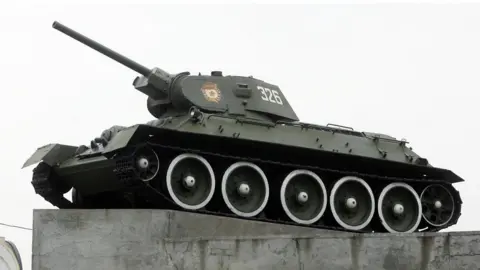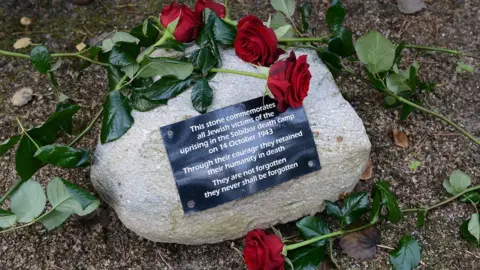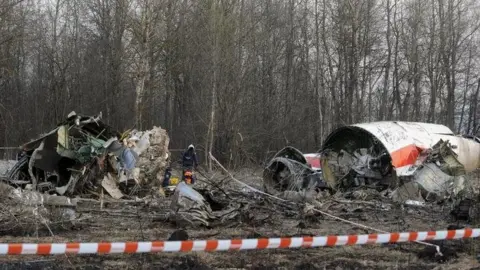Russia warns Poland not to touch Soviet WW2 memorials
 AFP
AFPThe Russian government has warned Poland that it will face sanctions if it removes monuments glorifying the Soviet victory in World War Two.
Last month Poland updated its "de-communisation" legislation, banning "totalitarian" symbols, which would include Soviet propaganda monuments.
Now Russian foreign ministry officials have warned of "asymmetric measures" if Poland removes Soviet war monuments.
Russia could refuse visas for Polish officials or downgrade trade relations.
The officials, quoted by the Russian daily Izvestia, were not named.
The Red Army's defeat of Nazi German forces on Polish soil in 1944-1945 remains a thorny issue in Russian-Polish relations.
Many Poles viewed the Red Army as an occupation force, not as liberators, as the 1939 Nazi-Soviet pact had carved up Poland between two dictatorships.
The Russian foreign ministry has also expressed anger at Poland's decision to exclude Russia from an international project to build a museum at Sobibor, site of a notorious Nazi death camp.
The ministry said Russia had been invited to join the project in 2013, but this month it was told that the Polish government wanted to keep the original group involved, from Poland, Israel, the Netherlands and Slovakia.
The ministry accused Poland of "Russophobia" and of "striving to belittle the USSR's role as liberator". In 1943 a Soviet Jewish prisoner-of-war, Lt Alexander Pechersky, led a desperate uprising against the Nazi SS corps by Jewish inmates at Sobibor.
 AFP
AFPEarlier this month the Russian foreign ministry condemned the new Polish "de-communisation" law as "an outrageous provocation", and warned of unspecified "consequences".
"The USSR paid the highest price to liberate Poland - on that country's soil, in battles with the enemy, more than 600,000 Soviet soldiers and officers died and were buried. Hundreds of thousands of Soviet prisoners of war, who died in Nazi concentration camps, also lie in Polish soil," the ministry said.
Polish officials have been quoted as saying monuments at Soviet war cemeteries will remain untouched.
Scars of World War Two
There are about 500 Soviet war memorials in Poland, Izvestia reports, and about 4,000 across central and eastern Europe as a whole. Hungary has the largest number of such memorials.
In 2007, Estonia's removal of a Red Army statue in its capital Tallinn sparked a violent protest by Russian speakers and a massive cyber attack on Estonian official websites. Russian hackers were blamed for that attack.
 AFP
AFPPolish-Russian relations deteriorated dramatically in 2010, when a plane carrying dozens of top Polish officials crashed in thick fog near Smolensk, in western Russia. Among the dead was ex-President Lech Kaczynski.
Investigations found that pilot error was to blame, but some Polish officials suspect that Russian air traffic controllers deliberately misled the crew.
The crash was especially poignant as the plane was on its way to a commemoration of the Polish officers slaughtered by Soviet secret police in Katyn forest in 1940.
Meanwhile, a fierce controversy has swirled around a new World War Two museum in the Polish city of Gdansk. In January, Poland's nationalist government won a court ruling enabling it to change the exhibits there, to fit a more narrowly Polish narrative about the war.
